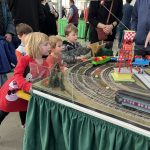You can go home again, but it may not be there
I made the transition from country folk to city dweller fairly smoothly.
Of course, I was 22 then; that age when life sprawls out in front of us full of possibilities. The rest of my family was perfectly content on the farm. My father, who had worked in Chicago for a time after WWII, had settled comfortably back into the routines of country life, and my mother couldn’t imagine living where she couldn’t sit in the backyard and watch the stars on warm summer nights. Even my siblings loved it, but I was the odd one out — even when I was small, the allure of sidewalks, where Dick, Jane & Sally took their bikes for a smooth, effortless spin, was magical.
When we drove into town on Saturday mornings to visit the library and pick up groceries, I dreamed that someday we might move onto one of those tree-lined streets where, even in winter, there were kids just down the block to play with, instead of two miles away on an icy gravel road. Somehow it just seemed friendlier, people living so close together. In the summer, the only place close enough for me to walk to was the woods at the back of our property where, if one sat quietly enough, a deer might venture past. Or I could head over to the grove of maples in the north pasture where turtles sunned themselves on the banks of the creek that rambled through.
It never occurred to me that I might miss these things once I made the move to the city. After all, I loved people, in all their infinite variety, and I met a vast number of them every day, both at work and through daily life in Milwaukee. Some of them became the kind of friends that pass through your life, enrich it in some way and move on when it is time; some of them stayed on to become those precious members of my “family of the heart.” I also loved the seemingly endless number of places to go and things to do in the city, from walks along the lakefront in summer to exploring antique shops and museums in winter. We went “home” for the holidays and to visit family, but Milwaukee quickly became my real home.
When I was young, Sunday afternoon entertainment was often a long, leisurely car ride on country roads, and my father would point out the remnants of old homes, a broken windmill covered in vines, a crumbling pile of fieldstones — all that remained of an old barn’s foundation. I wondered who had lived there, and if someone still remembered the place as home.
It was a difficult decision to sell the farm after my parents died, but we all agreed that it was the best thing to do. Over time, farming has become agribusiness in Wisconsin. The only small farms left in the area where I grew up are a few dedicated to organic farming and those owned by the Amish, whose industriousness and dedication to the land are admirable. Most of the old farms such as ours have become home to city dwellers who want space or “farmettes,” which are, as far as I can figure out, parcels of land on which there is room for a chicken or two and a charming, red and white painted shed that resembles a “barnette.”
I am finding in recent years that long walks through the park or out onto the pier are no longer enough. I feel a growing need to be where nature is not confined, where on long walks the element of surprise is still present, where it is dark at night — that velvet, all-encompassing darkness that allows me to see the smallest of stars. The young man who bought our family farm has kindly offered to let us visit whenever we want, but I cannot yet bring myself to face the flat, bulldozed space where once stood the old frame home that was supposed be there forever. I may never be ready.
There are some walks that can only be taken in the heart.
Cover image courtesy of Michael Peterson via Flickr Creative Commons.























This is a nice tribute to not just your family farm but also your parents who knew what they loved. Although the bulldozed space is heartbreaking, it’s heartwarming to have those memories. Thanks for sharing – my family is in a similar situation now that my parents have retired and moved off the farm.